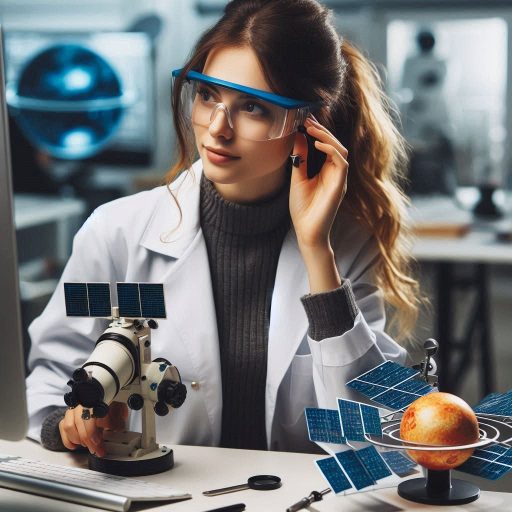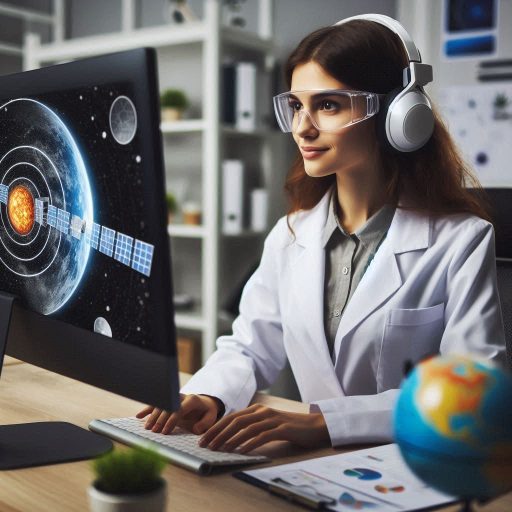Introduction
Space scientists study celestial phenomena and explore the universe’s mysteries.
They analyze data collected from telescopes, satellites, and space missions.
These scientists come from various fields, including astronomy, astrophysics, planetary science, and astrobiology.
They work collaboratively to understand the origins of the universe and the potential for life beyond Earth.
The roles of space scientists are crucial for advancing space exploration.
They develop and design experiments to test theories about celestial bodies and cosmic events.
Space scientists contribute to missions that investigate planets, moons, and asteroids, helping us learn about our solar system.
Their work also plays a significant role in developing technologies for space travel.
They collaborate with engineers to create instruments that can withstand harsh space conditions.
This innovation leads to safer and more efficient space missions.
Furthermore, space scientists help us understand Earth’s place in the universe.
By studying other planets, they gain insights into climate change and planetary processes.
Their research informs efforts to protect our environment and assess the habitability of other worlds.
Space scientists are essential for expanding our knowledge of the universe.
Their contributions drive space exploration and enhance our understanding of Earth‘s environment and potential for life beyond our planet.
Education and Training
Degrees Required to Become a Space Scientist
Most space scientists hold at least a bachelor’s degree in a relevant field.
Common degrees include astrophysics, astronomy, physics, or engineering.
These programs provide foundational knowledge essential for understanding space science concepts.
Many aspiring space scientists pursue advanced degrees to enhance their qualifications.
A master’s degree or Ph.D. opens up more advanced research opportunities.
Graduate programs often allow students to focus on specific areas of interest, such as planetary science or cosmology.
During their studies, students engage in laboratory work and practical experiences.
These experiences help them develop essential skills in data analysis and experimental design.
Coursework often includes mathematics, computer programming, and instrumentation, all critical for space science careers.
Internships during college provide valuable hands-on experience.
Many universities partner with space agencies or research institutions.
These internships offer students opportunities to work on real-world projects alongside experienced scientists.
Specialized Training Needed for Specific Roles
Space science encompasses various roles, each requiring specialized training.
For instance, planetary scientists study celestial bodies like planets and moons.
They often need expertise in geology and remote sensing techniques.
Astrobiologists focus on the potential for life in space.
They require a solid understanding of biology, chemistry, and environmental science.
Their training emphasizes understanding extreme environments, both on Earth and beyond.
Astronomers, on the other hand, specialize in observing celestial phenomena.
They often use telescopes and other instruments to gather data.
Specialized training in optical and radio astronomy is essential for this role.
Engineers play a vital role in designing and building spacecraft and instruments.
Aerospace engineering degrees provide the necessary technical knowledge for these positions.
Engineers must also stay updated on advancements in materials and propulsion technologies.
Additionally, space scientists often benefit from training in computer programming and data analysis.
Data from telescopes and space missions requires processing and interpretation.
Proficiency in programming languages and software tools is essential for success.
Some roles may require certification or additional training in specific technologies.
For example, scientists working with satellite data may need training in satellite remote sensing.
This training helps them effectively analyze and interpret data from space missions.
Becoming a space scientist involves obtaining relevant degrees and specialized training.
A strong educational foundation in fields like physics or engineering is essential.
Advanced degrees enhance career opportunities and allow for focused research.
Specialized training prepares scientists for diverse roles within the field, from planetary exploration to astrobiology.
Hands-on experiences, such as internships, provide valuable insights into real-world applications.
As space exploration continues to advance, the demand for skilled space scientists grows.
Their work plays a crucial role in unraveling the mysteries of the universe and enhancing our understanding of space.
Read: Women in Botany: Celebrating Pioneers and Leaders
Responsibilities of space scientists
Conducting Research and Experiments
Space scientists conduct extensive research to answer fundamental questions about the universe.
They explore topics like planetary formation, cosmic radiation, and dark matter.
These investigations often involve designing and executing experiments.
Researchers develop hypotheses based on existing theories and observations.
They formulate questions that drive their research efforts.
This process is essential for advancing scientific knowledge and understanding.
Space scientists utilize various methods to conduct experiments.
They may use telescopes, satellites, or laboratory simulations to gather data.
For instance, they study the behavior of materials in microgravity environments.
Fieldwork also plays a significant role in space science.
Scientists may conduct experiments in extreme environments, such as deserts or Antarctica.
These locations mimic the conditions of other planets and provide valuable insights.
Moreover, space scientists often publish their findings in scientific journals.
Sharing research results contributes to the global body of knowledge.
It allows other scientists to build upon their work and further our understanding of space.
Analyzing Data Collected from Space Missions
Data analysis is a critical component of a space scientist’s role.
They analyze vast amounts of data collected from space missions.
This data includes images, spectrometric readings, and telemetry from spacecraft.
Scientists use advanced software and statistical tools to interpret this data.
They look for patterns, anomalies, and significant findings that contribute to their research questions.
This analysis can lead to groundbreaking discoveries.
Space scientists also verify the accuracy and reliability of the data.
They check for errors or inconsistencies that may affect their conclusions.
Ensuring data integrity is essential for maintaining scientific credibility.
Additionally, scientists may develop models to simulate space phenomena.
These models help predict outcomes and test hypotheses.
They provide insights into complex processes that occur in space.
The results of data analysis often have far-reaching implications.
They can inform mission planning for future space exploration.
Moreover, they enhance our understanding of the cosmos and our place within it.
Collaborating with Other Scientists and Engineers
Collaboration is vital in the field of space science.
Space scientists work closely with other scientists and engineers to achieve common goals.
They often join interdisciplinary teams to tackle complex problems.
Collaboration enhances creativity and innovation.
It allows scientists to leverage the expertise of others in their field.
For example, they may work with engineers to design and build instruments for space missions.
Moreover, space scientists participate in international partnerships.
Collaborative projects across countries bring together diverse perspectives and resources.
These partnerships can lead to significant advancements in space exploration.
Networking and communication are essential skills for space scientists.
They attend conferences, workshops, and seminars to share ideas and findings.
Engaging with the broader scientific community fosters collaboration and knowledge exchange.
Furthermore, mentorship is an integral part of collaboration.
Experienced scientists guide and support early-career researchers.
This mentorship nurtures the next generation of space scientists.
Space scientists play a vital role in expanding our understanding of the universe.
They conduct research and experiments, analyze data from missions, and collaborate with experts in the field.
Each of these responsibilities contributes to the collective pursuit of knowledge in space science.
By exploring the cosmos, these scientists help us comprehend fundamental questions about our existence and the universe we inhabit.
As technology advances, their work will continue to unveil the mysteries of space and inspire future generations.
Read: How Climate Change Is Impacting Plant Research
Different roles within the field
Astronomers Studying Celestial Bodies and Phenomena
Astronomers focus on observing celestial bodies and phenomena.
They study stars, planets, moons, and galaxies to understand the universe.
Using powerful telescopes, astronomers collect data from various wavelengths of light, including visible, infrared, and radio.
Many astronomers specialize in specific areas, such as planetary science or stellar dynamics.
Planetary astronomers study planets and their atmospheres, while stellar astronomers investigate the life cycles of stars.
Their research helps us learn about the origins and evolution of celestial bodies.
In addition to observational work, astronomers often analyze large datasets.
They use software to model and simulate cosmic events.
This analysis leads to new discoveries about the universe and enhances our understanding of its structure.
Astronomers also collaborate with other scientists and institutions.
They contribute to space missions, sharing their expertise to ensure successful outcomes.
By working together, astronomers expand our knowledge of the cosmos and inspire future generations.
Astrophysicists Researching the Physics of the Universe
Astrophysicists study the fundamental physics underlying celestial phenomena.
They seek to understand how the universe works through mathematical models and experiments.
This field combines principles of physics, mathematics, and astronomy to explore cosmic events.
Astrophysicists focus on a wide range of topics, including black holes, dark matter, and cosmic radiation.
They investigate how these phenomena influence the universe’s structure and evolution.
Through their research, they help answer fundamental questions about existence and the nature of reality.
Many astrophysicists use computer simulations to model complex cosmic interactions.
These simulations help predict outcomes and test theories about the universe.
By comparing simulations with observational data, they refine their understanding of astrophysical processes.
Additionally, astrophysicists often collaborate with other researchers and institutions.
They contribute to significant projects, such as the study of gravitational waves or cosmic background radiation.
Their work helps expand our knowledge of the universe and its mysteries.
Aerospace Engineers Designing Spacecraft and Equipment
Aerospace engineers play a crucial role in space exploration by designing spacecraft and equipment.
They work on various projects, from satellites to crewed missions.
Their expertise ensures that these technologies are safe, efficient, and effective.
These engineers apply principles of physics, mathematics, and material science.
They consider factors such as aerodynamics, propulsion, and structural integrity.
By understanding these principles, aerospace engineers create reliable designs for space missions.
In addition to design work, aerospace engineers conduct rigorous testing.
They evaluate spacecraft and equipment under simulated space conditions.
This testing ensures that technologies can withstand the harsh environment of space.
Collaboration is essential in aerospace engineering.
Engineers work closely with scientists, technicians, and project managers.
This teamwork ensures that all aspects of a mission are well-coordinated and successful.
Space scientists play diverse and crucial roles in exploring the universe.
Astronomers study celestial bodies, astrophysicists research the universe’s physics, and aerospace engineers design essential technologies.
Together, these professionals advance our understanding of space and contribute to significant discoveries.
Their work inspires future generations and expands the horizons of human knowledge.
Read: Exploring the Different Branches of Geology

Find Out More: Famous Cases Solved by Forensic Scientists
Challenges faced by space scientists
Limited Funding for Research Projects
One of the primary challenges space scientists face is limited funding for research projects.
Government agencies and private organizations allocate finite budgets for scientific exploration.
This financial constraint often forces scientists to prioritize certain projects over others.
Limited funding can slow the progress of innovative research.
Scientists may have groundbreaking ideas but lack the necessary resources to implement them.
This restriction can hinder advancements in technology and understanding of space phenomena.
Grant applications and proposals require significant effort and time.
Researchers must compete with many others for the same funding sources.
The competitive nature of securing funding can be discouraging and stressful for scientists.
Furthermore, funding cuts can result in project cancellations or downsizing.
These decisions can impact job security for many researchers in the field.
Scientists must adapt to shifting financial landscapes while striving to achieve their research goals.
Technical Difficulties During Space Missions
Technical difficulties during space missions present another significant challenge.
Space missions often rely on complex systems and technologies that can fail.
These malfunctions can jeopardize the entire mission and lead to the loss of valuable data.
Designing and testing equipment for space travel is a rigorous process.
Engineers and scientists must ensure that systems function flawlessly in extreme conditions.
However, unforeseen issues can arise, requiring quick thinking and problem-solving skills.
Communication between Earth and spacecraft can be limited.
Delays in relaying information can hinder decision-making during critical moments.
Scientists must remain adaptable and prepared to handle unexpected challenges.
Additionally, the high stakes of space missions can lead to immense pressure.
Teams must work long hours to troubleshoot problems and ensure mission success.
This stress can impact the overall morale and well-being of those involved.
Physical and Mental Toll of Working in Extreme Conditions
Working in extreme conditions takes a physical and mental toll on space scientists.
Many scientists spend extended periods in isolated environments during missions.
This isolation can lead to feelings of loneliness and anxiety.
Space missions often involve long hours of work with little downtime.
The intense focus required can lead to mental fatigue and burnout.
Scientists must develop strategies to manage stress and maintain their well-being.
Physical challenges also arise during missions.
Scientists may experience changes in their health due to microgravity.
Muscle atrophy and bone density loss can occur, necessitating rigorous exercise regimens.
Additionally, the extreme conditions of space can be harsh on equipment and personnel.
Scientists must remain vigilant to ensure their safety and the integrity of their work.
The combination of these factors can create a demanding work environment.
Space scientists play a vital role in expanding our understanding of the cosmos.
However, they face significant challenges, including limited funding, technical difficulties, and extreme working conditions.
These challenges can impact their work and overall job satisfaction.
Despite these obstacles, their commitment to advancing our knowledge of space remains unwavering.
By addressing these challenges, space scientists continue to push the boundaries of exploration and discovery.
Read: Top Skills Needed for a Successful Geology Career
Impact of space scientists on society
Advancements in Technology and Innovation
Space scientists leverage cutting-edge technologies to explore the universe.
They develop sophisticated instruments that can capture data from distant planets and stars.
For example, telescopes now use adaptive optics to enhance image clarity.
These advancements allow scientists to observe celestial bodies in unprecedented detail.
Moreover, space missions have benefited from innovations in propulsion technology.
Engineers design more efficient rockets that reduce travel time to distant destinations.
New propulsion systems, such as ion thrusters, increase mission possibilities and decrease costs.
Data analysis has also transformed through technological advancements.
Scientists use machine learning algorithms to process vast amounts of data.
This capability helps them identify patterns and make predictions about cosmic events.
These technologies allow space scientists to uncover insights that were previously unattainable.
Satellite technology has significantly advanced our understanding of Earth and other planets.
Satellites monitor weather patterns, climate changes, and natural disasters.
They provide critical data for research and inform disaster response strategies.
These advancements enhance our ability to study both terrestrial and extraterrestrial environments.
Instruments aboard spacecraft have also evolved.
Modern spacecraft now carry high-resolution cameras and spectrometers.
These tools analyze the chemical compositions of distant worlds and collect essential data for research.
Technological innovation in space exploration continues to push the boundaries of our knowledge.
Inspiring Future Generations of Scientists and Space Enthusiasts
The work of space scientists inspires future generations.
Their discoveries spark curiosity and interest in science and technology.
Many young people dream of becoming astronauts or scientists because of their achievements.
Educational programs promote STEM (Science, Technology, Engineering, and Mathematics) fields to inspire students.
Schools often host workshops and events featuring space scientists.
These interactions provide students with role models and encourage them to pursue careers in space science.
Public outreach initiatives also play a vital role.
Organizations, such as NASA, offer educational resources and programs for students.
They engage young audiences through hands-on activities and interactive experiences.
This exposure helps cultivate a passion for space exploration and scientific discovery.
Additionally, popular media portrays space scientists as heroes.
Movies, documentaries, and books highlight their contributions and discoveries.
These portrayals can motivate young people to explore careers in science and technology.
Internships and mentorship programs connect students with professionals in the field.
These opportunities provide valuable experience and guidance for aspiring scientists.
They help bridge the gap between education and real-world applications of scientific knowledge.
Space scientists significantly contribute to our understanding of the universe.
Their advancements in technology and innovation propel space exploration forward.
These breakthroughs not only deepen our knowledge but also inspire future generations.
By engaging students through educational programs and outreach initiatives, space scientists ignite curiosity and passion for science.
As they continue to explore the cosmos, they pave the way for new discoveries and inspire the next generation of scientists and space enthusiasts.
Conclusion
Space scientists play a crucial role in advancing our understanding of the universe.
They study celestial bodies, phenomena, and the fundamental laws of physics.
Through their research, they uncover insights about the origins of the universe and the potential for extraterrestrial life.
These scientists work across various fields, including astronomy, planetary science, and astrobiology.
Their contributions lead to groundbreaking discoveries, such as exoplanets and cosmic microwave background radiation.
Space scientists also develop and utilize advanced technologies for space exploration, enhancing our ability to gather data.
The importance of space scientists extends beyond academic research.
Their work inspires future generations and encourages interest in STEM fields.
By pushing the boundaries of knowledge, they fuel technological advancements that benefit society.
Supporting and appreciating the work of space scientists is essential.
Advocating for funding and resources ensures continued exploration and research.
Engaging in public discussions about their findings promotes awareness and excitement about space science.
Everyone can play a role in appreciating their efforts.
Attend public lectures, visit planetariums, or participate in community events related to space.
Your support helps sustain the passion and dedication of space scientists.
Transform Your Career Today
Unlock a personalized career strategy that drives real results. Get tailored advice and a roadmap designed just for you.
Start Now[E-Books for Sale]
The Big Book of 500 High-Paying Jobs in America: Unlock Your Earning Potential
$19.99 • 500 High-Paying Jobs • 330 pages
Explore 500 high-paying jobs in America and learn how to boost your career, earn more, and achieve success!
See All 500 High-Paying Jobs of this E-Book
1001 Professions Without a Degree: High-Paying American Jobs You Can Start Now
$19.99 • 1001 Professions Without a Degree • 174 pages
Discover 1001 high-paying jobs without a degree! Unlock career tips, skills, and success strategies for just $19.99!




